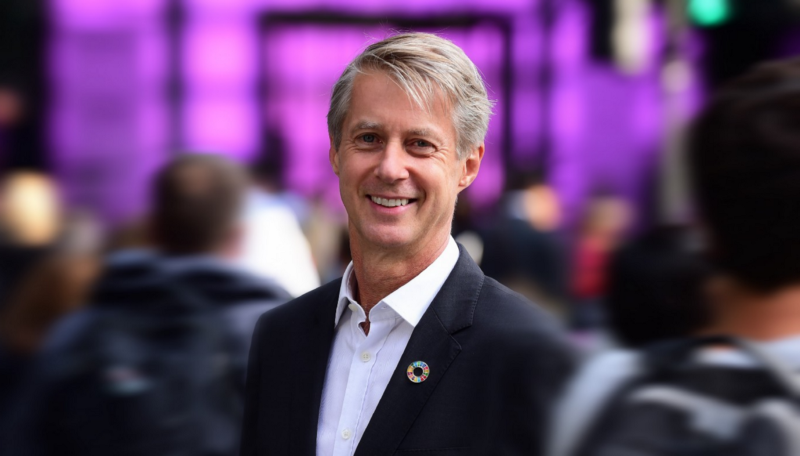Mats Granryd is Director General of the GSMA, the mobile industry trade association that organizes Mobile World Congress, an annual industry event in Barcelona that attracts over 100,000 participants. Prior to joining the GSMA in 2016, Granryd was President and CEO of Tele2, one of Europe’s fastest-growing telecom operators with more than 16 million customers across nine countries. During his career he spent 15 years in a variety of roles at telecommunications equipment manufacturer Ericsson, serving as head of Northern Europe and Central Asia, North West Europe, India, CDMA and the North Africa units, as well as global customer accounts for Vodafone and Bharti.
Under Granryd’s leadership the mobile industry became the first sector to broadly commit to the United Nations Sustainable Development Goals (SDGs) in 2016. He is now spearheading initiatives to accelerate the mobile industry’s impact on all 17 of the SDGs, across both developed and developing markets.
Granryd serves on the Broadband Commission for Sustainable Development, which is focused on leveraging technology for sustainable development. Within the Commission, he chairs the Working Group on Digital Gender Divide to foster the equal inclusion of women and girls in broadband access and use. From 2016 to 2018, he was also a Commissioner on the Business & Sustainable Development Commission, working with CEOs across many industries to make a business case for achieving a sustainable, inclusive economy. He recently spoke to The Innovator about the evolving role of the mobile operator, and the industry’s role in establishing digital identity, impacting SDGs and ensuring data privacy, the importance of trust and the rollout of 5G.
Q : How is the role of mobile operator evolving ?
MG : We are living in extraordinary times. Social, political and technological disruption is shifting the role mobile operators play in society and what will be fundamental to their long-term success.
Great leaps forward in technolgy — as we enter the era of iIntelligent cConnectivity — will transform our society. ‘Trust’ is the new collateral in this digital world. It’s something that every business leader has to build if they are going to be sustainable. This requires a collective commitment to innovate with foresight and care, and to work closely with regulators, other businesses, digital pioneers, governments, and of course, consumers. These changes aren’t just affecting the role of mobile operators but all businesses. An increasing percentage of CEO’s are shifting perspectives to allow people and the planet to take precedence over short-term financial targets. Our launch of the Digital Declaration at Davos recognizses this shift.
Q : The Digital Declaration that the GSMA launched during the World Economic Forum in Davos has so far been signed by CEOs representing 40 companies including Bharti Airtel, China Mobile, China Telecom, Deutsche Telekom, Ericsson, IBM, KDDI, KT, LG Electronics, Mobile World Capital Barcelona, Nokia, NTT DOCOMO, Orange, Samsung Electronics, Sharp, SK Telecom, Sony Corporation, STC Group, Telefónica, Turkcell, Verizon, Vodafone and Xiaomi. What is the declaration’s purpose?
MG: The declaration is meant to serve as a guide to acting ethically in the digital era.. It is expected that by 2022, 60% of GDP will be digitized. The arrival of 5G networks will further accelerate this change. At the same time consumers are rightfully expecting more from digital services, while their trust in businesses is being tested. I strongly believe a new form of responsible leadership is needed to successfully navigate this era. The Digital Declaration principles call on businesses to respect the privacy of digital citizens; handle personal data securely and transparently; take meaningful steps to mitigate cyber threats; and ensure everyone can participate in the digital economy as it develops while combatting online harassment. It’s about us delivering what matters most to consumers, industry and governments — building trust, inclusive growth and innovation.
Q : What is the role of the GSMA in helping the industry figure this out ?
MG : We are unifying CEOs behind common ethical principles to guide their journey and helping support dialogue between industry, government and regulators. To help business leaders accelerate their own progress in designing a better future we are also sharing best practice that inspires others to join this global movement that’s been ignited by the mobile industry.
Q : Establishing a secure digital identity will be key to the success of the Internet of Things. GSMA has launched Mobile Connect, an approach to digital identity that allows people to use their mobile phones to log into website and applications with a single login without the need to remember multiple passwords. What is the goal of the program ?
MG : Through Mobile Connect, mobile operators are fulfilling an important role in the digital identity space. It has already been deployed by 71 operators in 31 markets, with over 484 million active users globally. Where it’s really making a difference is bringing secure and convenient services to people living in poverty and displaced people who couldn’t access essential banking, health and e-government services before.
How is the mobile industry impacting SDGs ? Please be specific.
MG : The lives of over five billion people have been radically impacted by the advent of mobile technology. Yet we’ve only just scratched the surface. Between now and 2030, the mobile industry will link billions more people and things online. Our expanding connected network is directly contributing to addressing the UN Sustainable Development Goals in many ways from giving vital access to clean water, sanitation and education to reducing inequalities and building sustainable cities and communities. I am proud to say that in 2016 the mobile sector became the first sector to commit to all 17 SDGs. We have already enabled more than 1.2 billion people to improve their or their children’s education through mobile and our industry has provided essential humanitarian assistance to more than 30 million people during epidemics and natural disasters. We have increased mobile penetration to the poorest populations living in developing countries and also empowered more than 16 million women by giving them access to mobile money. This is just a few examples of where we are making an impact. Our ‘Mobile Industry Impact Report’ shows that we have increased impact across all 17 SDGs.
Q : There is growing industry concern about the potential use of Huawei’s telecom equipment as a back door to spy on the West. The issue is making headlines nearly everyday. How is the GSMA handling this and what — if any impact — will there be on MWC this year ?
MG : There is growing concern but we have yet to see any evidence to substantiate these claims. We will continue to follow this issue and are closely monitoring any impact on the global mobile ecosystem. We do not anticipate that this will have any impact on MWC. A great number of Chinese organizations including Huawei are planning to join us in Barcelona and their executives are speaking at keynotes and seminars throughout the week.
Q : 5G has been a topic for the last several years. What is the best estimate on global roll-out of the technology ?
MG : We are going to see the first commercial 5G services launching this year. This will be the precursor for lots more 5G activity, as we see ultra-fast networks light up exciting new possibilities in health, education, manufacturing and much more around the world. We hope the early launches in the United States, South Korea, the UAE and China will inspire more countries to do what needs to be done to make 5G a reality. Creating the right policy environment for operators including timely access to the right spectrum under the right conditions will be key to being a frontrunner in 5G deployments.
According to GSMA Intelligence, getting this right will mean that there will be more than 1.4 billion 5G connections globally by 2025 — or about 15% of the total market by this point.
Q : Is is it fair to say that the emphasis is moving away from the infrastructure to what can be done with intelligent connectivity ?
MG : I’d say the two go hand in hand. Intelligent Connectivity describes the combination of endless connectivity enabled through 5G and the Internet of Things, with the powerful intelligence delivered by big data and artificial intelligence. It will transform how consumers live their everyday lives, how entire industries innovate and operate, and how economies flourish. All of this isn’t possible without the development of infrastructure. Intelligent Connectivity is driving innovation and will be an important theme at Mobile World Congress in Barcelona this month.
During the World Economic Forum in Davos the GSMA launched a ‘Digital Declaration’ that has so far been signed by CEOs representing 40 companies including Bharti Airtel, China Mobile, China Telecom, Deutsche Telekom, Ericsson, IBM, KDDI, KT, LG Electronics, Mobile World Capital Barcelona, Nokia, NTT DOCOMO, Orange, Samsung Electronics, Sharp, SK Telecom, Sony Corporation, STC Group, Telefónica, Turkcell, Verizon, Vodafone and Xiaomi. What is the declaration’s purpose?
MG: The declaration is meant to serve as a guide to acting ethically in the digital era. It is expected that by 2022, 60% of GDP will be digitized. The arrival of 5G networks will further accelerate this change. At the same time consumers are rightfully expecting more from digital services, while their trust in businesses is being tested. A I strongly believe a new form of responsible leadership is needed to successfully navigate this era. The Digital Declaration principles call on businesses to respect the privacy of digital citizens; handle personal data securely and transparently; take meaningful steps to mitigate cyber threats; and ensure everyone can participate in the digital economy as it develops while combatting online harassment. It’s about us delivering what matters most to consumers, industry and governments — building trust, inclusive growth and innovation. The more data is trustworthy, the more growth and innovation we will have. We need local innovation in local languages and less power in the hands of a few giant players, in order for the power of intelligent connectivity to spread globally.







